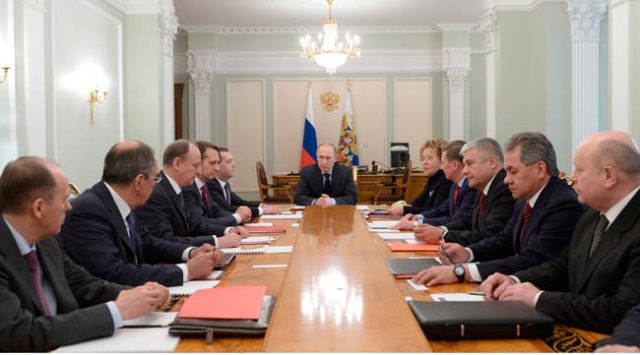
Moscow Cannot Afford a South Ossetian Strategy in Ukraine’s Donbas
Publication: Eurasia Daily Monitor Volume: 14 Issue: 94
By:

Vladimir Putin has slammed the brakes on a much-ballyhooed Duma proposal to offer Ukrainians in the occupied Donbas region Russian citizenship on a simplified basis (Kommersant, July 18). Almost certainly, the initiative was abandoned because if these individuals were to obtain that status—as the residents of the breakaway “Republic” of South Ossetia did almost a decade ago—then Moscow would have to assume responsibility for them. And this is something the Kremlin clearly recognizes it cannot presently afford.
Numerous Duma members and others in Russia who support this idea see a simplified path to Russian citizenship as opening the way for the ultimate annexation of Donbas. But many in the Kremlin recognize such an outcome would be extremely costly financially and politically. Financially, it would put burdens on Moscow to come up with money to provide at least basic services to several million people; and politically, it would mean that the Kremlin would be eliminating the chief lever it hopes to have in Ukraine as well as further isolating the Russian Federation from the Western powers.
This turn of events suggests that Putin, if not all the members of the Duma, recognizes that while Moscow benefits in many ways from the so-called “frozen” conflict in Donbas, it could lose big by taking any dramatic step to further destabilize the situation. In turn, that means today’s announcement that the Moscow-backed leadership of Russian-occupied Donbas plans to form “a successor state” to Ukraine—“Malorossiya”—should be dismissed as nothing more than the latest incarnation of the Russian propaganda project “Novorossiya.” One may, thus, readily expect that this new iteration will ultimately fail to materialize just like “Novorossiya” did. And in fact, Ukrainian President Petro Poroshenko is already predicting such a fate (Spektr.press, July 18).
Putin’s decision to quash the Duma bill was reported in today’s (July 18) Kommersant and quickly picked up by Ukrainian outlets (Kommersant, Dsnews.ua, July 18). Deputy Konstantin Zatulin’s proposal on the simplification of citizenship procedures for non-Russians specifically covers “bearers of the Russian language” who live on the territory of the former Russian Empire or the Soviet Union. Putin’s objections to the Zatulin bill were cast by the paper in terms of the entire region, but the Kremlin leader’s decision applies in the first instance to Ukrainians, especially those already living in the Russian Federation or in the Russian-occupied Donbas.
Tomorrow, the Duma will consider the measure but without the sweeping provisions Zatulin had offered. According to Kommersant, the United Russia deputy has already pulled them “on the recommendation of Duma speaker Vyacheslav Volodin, who suggested coordinating this with the Main Political Administration [of the parliament], the foreign ministry, the interior ministry, and the Russian government as a whole.” This brings to a halt what had appeared to be a runaway train. The Duma had already approved Zatulin’s idea on first reading because many of its members clearly felt that tens if not hundreds of thousands of Ukrainians would choose to become Russians overnight if they did not have to go through the current complicated system of obtaining written confirmation of their status as Ukrainians from the Ukrainian government. Kyiv has been slow to provide such confirmation documentation, according to Duma members.
Before Putin’s intervention, Duma members had been enthusiastic about the measure, convinced that it meant, in the words of Aleksey Polubota, a Svobodnaya Pressa commentator, that “Russia is preparing a ‘South Ossetian’ variant for Donbas.” The offer of Russian citizenship to people in the occupied regions would soon be followed by Moscow’s recognition of those regions as independent countries, he further predicted (Svobodnaya Pressa, July 15).
Duma deputies suggested that “by the most modest estimates,” some 700,000 Ukrainians would choose to become Russian citizens overnight, if the new simplified procedures were put in place. And many of them suggested this should have happened long before now, Andrey Yepifantsev, a Moscow analyst, told Polubota. The reason Moscow has moved in this direction, he said, was that Putin decided—on the basis of his recent meeting with United States President Donald Trump, in Hamburg—that the Minsk agreements on a Ukrainian ceasefire have no future. Rather, Yepifantsev argued that Russia must “repeat the steps it already took in Abkhazia and South Ossetia, the handing out of its passports. This shows that Moscow will assume responsibility for the defense of its citizens in the unrecognized republics” that will then become independent countries.
Aleksandr Shatilov, the dean of the sociology and political science faculty at the government’s Finance University, agreed. He told the Svobodnaya Pressa commentator that “receipt of Russian citizenship by residents of Donbas will mean that they will be under the protection of the Russian state.” Russians support such a move, even if some in the “Russian elite” still have “illusions” that they can reach a deal with the West on Ukraine, Shatilov asserted.
But Putin’s intervention, signaled by Kommersant today, shows that whatever “illusions” some in Moscow may have, the Russian government clearly believes it cannot afford to do what the Russian parliament would like.



